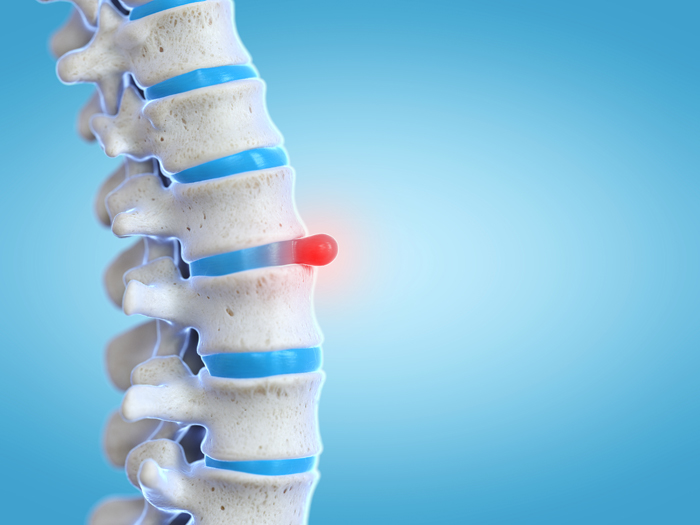Slipped disc Treatment & Diagnostics in Chembur, Mumbai
Slipped disc (Vertebral Disc Prolapse)
A slipped disc, otherwise known as a herniated disc, is a condition in which the soft, cushiony tissue in your spinal cord pushes out. It often applies pressure on the nerves there, leading to severe pain and other problems. Vertebral disc prolapse is extremely common and can usually be treated by a medical professional. To learn more about slipped disc, contact a vertebral disc prolapse specialist in Chembur.

What is a vertebral disc prolapse?
A vertebral disc prolapse or a slipped disc is a condition in which one of your vertebral discs slips out from your vertebral column. Usually, the prolapsed disc presses against the surrounding nerves, leading to severe pain and other problems. A spinal disc has a rubbery exterior that surrounds a soft, jelly-like nucleus. When the nucleus pushes out through a tear in the exterior disc, the condition is termed a slipped disc or ruptured disc.
What are the symptoms of vertebral disc prolapse?
The symptoms of a slipped disc can vary based on the location of the herniated disc and whether or not it is applying pressure on the surrounding nerves. Here are some of the common symptoms of a ruptured disc:
- Numbness and tingling: More often than not, herniated discs can press against a nerve or two. You might experience radiating numbness or tingling in the parts of your body that are served by the affected nerves.
- Weakness: The muscles that are served by the affected nerves can get weaker as a result of the pressure applied to those nerves. This effect can interfere with normal activities such as walking, lifting things, etc.
- Pain: If the ruptured disc is in your lower back, you will experience pain in your lower body in areas such as your glutes, thighs, calves and feet. If the slipped disc is in your neck, you will experience pain in your upper body in areas such as your arms and shoulders. The pain is usually sharp and burning. When you exert additional pressure (quick movements, sneezing, coughing, etc), the pain can shoot to your palms and feet.
When do you need to see a doctor?
If you feel any pain in your upper or lower body or any other symptom that makes you suspicious of having a ruptured disc, you should visit a vertebral disc prolapse hospital in Chembur.
You can request an appointment at Apollo Spectra Hospitals, Chembur, Mumbai.
Call1860 500 2244 to book an appointment.
What are the causes of vertical disc prolapse?
A herniated disc is typically caused by the wear and tear of the disc through time during a process called disc degeneration. Applying too much external pressure or going through an event involving heavy physical trauma can also lead to a slipped disc. Here are some of the common factors that influence disc degeneration:
- Age: Through time, your discs become less flexible and stiffer, leading to rupture. Wear and tear of your discs occur as you age due to prolonged use.
- Smoking: Smoking leads to decreased supply of oxygen to your spinal cord, leading to quicker and easier disc degeneration.
- Occupation: If your job requires heavy manual labor, you might be vulnerable to several back problems, including a herniated disc.
- Obesity: Being overweight or obese can lead to increased and prolonged pressure on your back muscles, bones and nerves, facilitating disc degeneration.
How can a slipped disc be treated?
Here are some of the common treatment procedures:
- Medication: OTC pain medication, Cortisone injections, muscle relaxers and opioids are commonly administered to people with vertebral disc prolapse.
- Physical therapy: Physical therapy includes a set of positions and exercises that can help you treat a ruptured disc.
- Surgery: If medicines and therapy fail to treat your slipped disc and your condition is worsening and causing you more pain with time, your doctor will recommend surgery to fix it. Surgery is usually the last resort.
Conclusion
A slipped disc can cause constant pain and discomfort, lowering the quality of your life. You can avoid it by maintaining a healthy lifestyle and prioritizing your posture. To get an early diagnosis and treatment, seek a consultation session with a vertebral disc prolapse specialist in Chembur.
Reference Links
https://www.mayoclinic.org/diseases-conditions/herniated-disk/diagnosis-treatment/drc-20354101
Often, a slipped disc can heal on its own. Generally, non-surgical treatments are tried first. Sometimes, simply applying a hot/ice pack or exercising regularly can help treat a ruptured disc. Once the slipped disc goes back into place, the pressure on the nerve will abate, relieving you of any pain.
After treatment, a ruptured disc takes about 4 to 6 weeks to completely heal. You may have to take painkillers and other medicines during the process.
Often, a slipped disc can press upon a nerve and cause severe pain. In very serious cases, a herniated disc can lead to paralysis.
Our Doctors
DR. SURBHI P. BHAGAT
MBBS, MD - Anaesthes...
| Experience | : | 21 Yeras Experience |
|---|---|---|
| Speciality | : | Pain Management... | Location | : | Tardeo |
| Timings | : | Mon to Sat : 01:00 P... |
Our Top Specialities
NOTICE BOARD
CONTACT US
CONTACT US
 Book Appointment
Book Appointment



.svg)
.svg)
.svg)
.svg)








